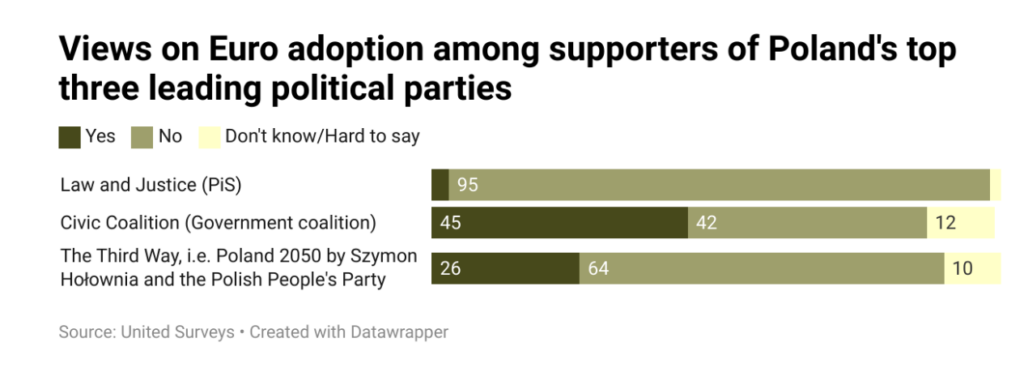News platform Brussels Signal published an article in April, titled ”Two thirds of Poles oppose adoption of the euro, poll shows”. Brussels Signal’s founder and publisher is Patrick Egan, who has connections to Hungarian Prime Minister Viktor Orbán’s Fidesz party. We began to question the claim because the platform’s political connections. However, we found in our fact check that the claim is true.
On 2 April 2024 news platform Brussels Signal published an article titled Two thirds of Poles oppose adoption of the euro, poll shows. The article was written based on a previously published article that appeared on the news portal called Wirtualna Polska. It was released on 31 March 2024. The article was based on a survey conducted by United Surveys and claimed that two thirds of Polish oppose adoption of the euro.
Poland’s currency
Poland is one of the seven European Union members that do not use the euro as their currency. The official currency in Poland is the Polish złoty. The liberal and EU-friendly government led by Donald Tusk (PO), aims to take Poland in a completely different direction from the previous government, led by the national-conservative Law and Justice party (PiS).
We interviewed a Finnish political scientist, Katalin Miklóssy. According to her, there are advantages for both the citizens and the country in retaining their own currency. “Of course, keeping their own currency is a matter of national interest considering both the cultural impact and fiscal policy. Having your own currency enables you to be able to devalue and float it”.

Fact check: The survey results
Brussels Signal’s founder, publisher and CEO is Patrick Egan. He is a former strategist for Hungarian Prime Minister Viktor Orbán’s Fidesz party. This is a political connection that might influence the publication’s impartiality.
The survey was commissioned by the Estonian company United Surveys. Even though the company is registered in Estonia, the owner of the company is Polish. According to the Estonian E-Business Register, the company has been deregistered because it has not submitted its annual reports for four consecutive years.
We contacted the company via email. They sent us the data from the survey, which we utilized in fact-checking. The data we received matched the content of the article on Wirtualna Polska. 1,000 Polish living in Poland were surveyed. The number of respondents is typical for such a survey. The survey methods combined a phone survey method (CATI) and a web survey method (CAWI) on a 50/50 ratio. The information was collected during 8–10 March 2024.
66.8% of the people surveyed were against the Euro. Based on the number of respondents we calculated the margin of error for this so called headline number to be ±2,9%.
According to the survey, the Law and Justice party’s supporters were opposed to Poland joining the Euro, with 79% of the PiS voters surveyed answering “definitely no.” The ruling party’s supporters were much more divided on the subject, with 21% answering “definitely yes” and 21% “definitely no.”
The number of people interviewed for the survey is large enough for the headline result to be considered reliable. However, the total number respondents in some responder subgroups (e.g., different education levels or age groups) may be too small for the subgroup-specific results to be reliable.
The specific numbers of respondents for each subgroup are not evident from the data, which makes it impossible to calculate subgroup-specific margins of error.
Subgroup-specific numbers can, however, be used to validate headline figures of the survey. Headline figures are the main results of the survey. In this article we are focusing on the 66,8%, which is claimed to be the share of Polish opposing the adoption of the euro.
Conclusion
After careful research we found that the survey this claim was based upon turned out to be reliable, with a sample size of 1,000 people. The data we received from the company corresponded to the results found in the article. Furthermore, the results correlate with the political atmosphere in Poland, about which we gained valuable information from Katalin Miklóssy, the Head of Eastern European studies at the University of Helsinki. In conclusion, the claim “two thirds of Polish oppose adoption of the euro” is true.
Research │Article © Milja Huotari, Enni Lahtinen, Vilja Nurmelin, Arsi Tammela, Haaga-Helia University of Applied Sciences, Finland
Leave your comments, thoughts and suggestions in the box below. Take note: your response is moderated.





